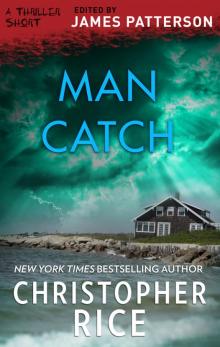- Home
- Christopher Rice
The Vines Page 13
The Vines Read online
Page 13
The man spins in place, gasping. Blake wouldn’t be surprised if he waved his arms at the ship for help. But instead he searches the roof, which slopes gently away from them on all sides. There is no angle from which he does not fear an attack; Blake and Blake’s new gun appear to be the least of his concerns.
He looks vaguely familiar, this wheezing, terrified stranger, much in the same way Mike Simmons was. Blake sees football team photos hanging on the walls of his high school. Rows of little faux gladiators down on one knee, clad in brilliant-white practice jerseys and pretentious scowls. They have been close before, he and this man, Blake is sure of it. Within inches of each other, in fact, during an encounter in the dark on another, more distant levee, this one on the shore of a massive lake, a spot where the prayers and intimate whispers of two frightened but very much in love young men named Blake and John lingered.
“Are you doing this to us?” the man rasps.
Blake doesn’t answer.
“Can they . . . can they get me up here?”
“I don’t know,” Blake says, because it’s the truth. “Kyle . . . Your name’s Kyle Austin. You broke your leg outside the cafeteria during lunch. You and your friends had a skateboard, and you were goofing off before the teacher caught you, and you . . .” What Blake wants to say is that when Kyle rolled over all those years ago, leg twisted at an impossible angle, he wore the same contorted, agonized expression he wears now. But Blake doesn’t want it to sound like he’s just now remembering who Kyle is. He wants Kyle to believe this was planned. He wants Kyle to feel trapped, because people who are trapped are more likely to talk. Just like Mike Simmons started talking to Caitlin after she shot him.
“What happened down there?”
“Scott went off . . .” As Kyle slows himself to catch the breath needed to explain, the sobs start: hiccuping, pathetic. “We were supposed to meet . . . She called, said she had Mike. . . . said she wanted to make a deal, but if we didn’t come tonight, she’d show everyone the tape—”
“What’s on the tape?”
“Us. It’s a side-street view, close to the levee. It’s got us parking, putting the hoods on. Then it’s got us running for it after we—after . . . Can they get up here? Those things. Can they get up . . .”
“I know how to use this gun, Kyle. I learned after what you guys did to me. Keep talking or I’ll put a bullet in your kneecap.”
Kyle lets out a strangled half laugh, half sob. “We came through the back way to surprise her, but when Scott saw you, he freaked. He thought she was giving you the tape and the whole thing was a setup and we’d walked into a trap . . .”
“You did.”
As if a nest of wasps has been kicked over inside his skull, Kyle bends at the waist and brings his fists to his temples and screams, “What are those things?”
Blake doesn’t answer. He doesn’t say, I don’t know. Doesn’t say, I just know how they move, and what they like to drink.
Instead he just asks, “Why?” Blake raises his voice to be heard over a fresh round of pathetic sobs. “Why did you kill him?”
“We didn’t! We weren’t—we were just supposed to scare you guys. He knew you guys met there, and he thought if we roughed you up a little bit that you’d stop . . . He was our coach, I mean. We just thought . . . But we all knew Simmons was crazy about gay shit. Coach must’ve thought that made him right for the job, but I thought it made him wrong. Dead fucking wrong! But I didn’t say anything. I should have said—”
“Coach?”
“Coach Fuller. But he didn’t ask for a pipe. He didn’t ask for a fucking pipe for God’s sake. Simmons is on that fucking tape, stepping out of the car and swinging the thing around like he’s some goddamn Viking. And nobody . . . nobody wanted . . .”
Vernon Fuller.
Blake sees the SUV parked across from the entrance to the emergency room where he works, sees the taillights as it speeds off in the milky predawn light, and now he realizes Vernon Fuller is making a last-minute escape from the living evidence of his crime. He sees Vernon Fuller, reeking of bourbon, turning in on himself in the pew at his own son’s funeral, quitting his job as athletic director, leaving their school’s winning football team without a coach, then divorcing his wife shortly thereafter, not even showing up at the hospital or her funeral after she got sick with cancer a decade later. Not grief-stricken. Guilt-ridden. Shattered.
Responsible.
“It’s not fair . . . ,” Kyle wheezes.
“Fair?” Blake asks him.
“He should be here too.”
When the floorboards creak behind him, Blake spins his head, without turning his back on Kyle. Caitlin has mounted the steps to the widow’s walk, her hair hastily pushed back from her forehead, but more clotted with dirt and blood than before.
“Why?” Blake asks.
“I told you. He wanted us to scare—”
“No—Vernon. Was Troy blackmailing Vernon too?”
“I don’t—”
The sound that comes next is like several tennis balls spitting from a practice machine, and suddenly Kyle Austin’s chin is gone, the rest of his final sentence lost in a fluid-sounding cough. The right side of his face is suddenly and hopelessly distorted by an eruption just beneath the skin, and for an instant Blake thinks the guy is about to do some clownish impression of someone and that’s why his face is all messed up. But then the three glistening stalks, each the thickness of a man’s arm, tug on Kyle’s frozen, erect body from where they have speared it in three different places. Kyle crashes through the section of floor the vines weakened when they punched through it only seconds before and disappears in a rain of debris.
“Bye, Kyle,” Caitlin whispers.
Blake watches the process repeat itself, watches Kyle hit the floor of the guest bedroom below, watches it give in exactly the same way. Kyle’s limbs don’t flail or tumble, but instead the vines hold him like a speared fish as they descend, wood and debris falling after him, and Kyle Austin’s fatal plummet looks like the sudden flight of a jet-pack-propelled superhero played in satirical reverse.
As Blake stumbles past her toward the steps, Caitlin reaches out for him. He bats her hand away, manages to catch the banister in his free hand before he falls forward over his own feet. The back of his throat is on fire.
He rights himself and makes it to the guest bathroom before emptying his stomach into the toilet. Even as he vomits, he is aware that he’s still holding the gun in one hand, that he’s laid it across the back of the toilet bowl, barrel aimed at the wall. He can’t let go of it even as his entire body, right down to the marrow in his bones, tries to repel what he’s just witnessed. To expunge it like a virus or an infection. And he wonders if he has a space in his brain or in his soul for monsters and demons, or if he will, like most people, choose insanity when confronted with a fearsome reality.
When Caitlin begins stroking the back of his head, his body rebels against that too. In an instant, he’s on his feet, gun raised, standing in the open bathroom door, and Caitlin has backed up into the hallway, shaking her head in disappointment, her hands going up.
“I said no,” Blake whispers. “You asked me what I wanted and I said no.”
Now there is anger in her eyes, a flash of it as she meets his stare head-on, as if he has left her alone with this nightmare simply by pointing out what she’s done to him. As if he was the one who betrayed her. As if he was the one who slashed her chest and threw her into that pit. It might have been his blood that sparked the vines, but their blood was on her hands.
And the earth knew that too.
Caitlin begins to speak. Before she can get a word out, there is a terrible buzzing sound from outside, made louder by the open door to the widow’s walk behind her. And from her startled expression and the way she looks dumbly to the ceiling overhead, Blake realizes this is not part of her plan, th
at this sound is unfamiliar to her as well. And for the first time that night, she looks frightened. When her eyes meet his, she is Caitlin again, unsteady, and full of insecurity that too often coalesces into self-hatred.
“Blake . . .”
The shadows of shifting tree branches along the sloping wall of the staircase behind her darken suddenly. Blake lets out a small cry, and Caitlin jerks at the sound, and her stare is suddenly expectant and desperate.
And then they hit her. It’s a column so thick the staircase behind her goes black. The open door disappears as she’s slammed into the opposite wall face-first. They’re piling up behind her, like ripples in water, and there’s no doubt that she is the locus, their target, that the great deafening and blinding cloud of insects now filling the upstairs hallway has come for Caitlin Chaisson and no one else. Not a single one has landed on his skin. Not a single angry thread of them heads in his direction as he backs up, the gun still raised stupidly on a target that has turned swirling and amorphous.
When Caitlin screams his name again, it’s as if the bugs themselves are absorbing her voice, amplifying it while also filling it with a great and inhuman rattle. And when she peels herself off the wall, arms batting wildly at the air all around her, Blake sees that she is literally losing her very matter to them, that as they pull free from her skin, mirroring her every action now at various distances from her body, they take more and more of her with them. There is no blood, no tearing of flesh. But they are consuming her. As she stumbles wildly toward the top of the grand staircase, they are devouring her.
“Blaaaaaaaaaaake!”
There is almost none of Caitlin Chaisson left in the scream. It is, rather, the voice of this terrible, all-consuming cloud of insects so tightly joined to one another it’s impossible to tell what species they’re composed of. And they are transforming Caitlin into something that is more writhing, desperate spirit than person, while ignoring Blake altogether. He literally does not exist for them.
At the top of the grand staircase, what remains of Caitlin inside the cloud loses its footing and goes over, and the swarm adjusts perfectly as Caitlin’s vaporous remnants tumble down the stairs, losing skin and flesh and bone on their descent so that halfway down the stairs, the matter inside of the swarm looks more like an abstract, animated sketch of Caitlin Chaisson’s fall than an actual person somersaulting down unforgiving wooden stairs.
At the bottom step, all traces of Caitlin the human are gone. It is only at that moment that the swarm lifts into the air, organizing itself beneath the swinging chandelier. A sudden, dizzying uniformity sweeps through each tiny member, and now there is a clicking and clattering of pincers and thicker, heavier wings. Each place within the miniature cyclone of insects Blake directs his attention, he sees bigger and more formidable creatures, flashes of stingers and antennae. But they’re all moving so fast, it’s impossible for him to get a detailed picture of a single one—they seem to exist only as a whole. Their buzzing sound has deepened from an outboard’s high-pitched whine to something that sounds more like a motorcycle’s growl.
Blake is about to fire at them. Maybe they’ll come after him, but he doubts it after the way they’ve been ignoring him. At the very least, it will disperse them. At the very least, it will give him something to do other than stand there, dumbfounded, emptied of recourse or any frame of reference for what he’s seeing, the gun in his hand now as powerful and protective as a fingernail clipper.
And then they’re gone.
It takes Blake a few seconds to see where they’ve gone to, and the effort requires him to stumble halfway down the grand staircase until he can see the hole that Kyle Austin’s body—not Kyle, the vines; the vines broke that hole—punched through the ceiling of the first floor. The more organized swarm of newly enlarged, otherworldly insects has spirited away up through the opening in the widow’s walk floor.
His vision blurs and blackens around the edges at the same time. He hears the gun falling barrel over butt down the stairs, feels a vague distant sense of alarm that it might fire, but it doesn’t. It lands at the bottom with a hollow-sounding thud. Hollow and useless against these new terrors of the night.
27
Left foot, right foot, breathe. Left foot, right foot, breathe.
It’s a mantra one of the senior nurses taught him after he first started working in the ER. She’d assured him it would come in handy after the first serious trauma case was wheeled in, an accident victim so hopelessly mangled her appearance in the emergency room was more of a grim formality than a first step toward recovery.
Left foot, right foot, breathe. Left foot, right foot, breathe.
There was a trick to the little saying he learned only later. It was meant to distract you from how shallow and stunted your breathing was by giving it the weight and duration of a single footfall. A normal breath should take two steps, not one. But by saying all three of them in rapid sequence, by giving them all the same illusory value and duration, you tricked yourself into believing you weren’t edging on a state of shock. And so that’s what Blake Henderson is doing now.
Nova is in the kitchen washing her hands at the sink, and for a second it’s possible to believe that she has somehow missed the whole thing. That she was watching television in the other room as some otherworldly force tore through the floor of the house, devouring flesh and bone, then retreating before a cloud of furious insects collected and absorbed Caitlin Chaisson as if she were a cloud of smoke. But there is steam billowing from the sink that says the water is as hot as it can go, and the bottle of soap she just used is lying on the floor next to her, and as Blake approaches her slowly, he can see her chest rising and falling, her slack, her lips sputtering with each strained breath.
“Nova?” he whispers.
And she jumps at this soft, unobtrusive sound as if it were a gunshot. Suddenly her hands are beside her head as if his slight utterance is something she must physically contain, something she must beat back before it reaches her ears. “I would like a . . . I w-would like a . . . I would like a . . .” Tears are spitting from her eyes. Her tone, though, is brittle but casual, as if she were about to ask him to pour her a glass of iced tea. It’s one of the worst cases of shock he’s ever seen, replete with repetitive gestures, hyperventilation, and a half-formed question that can’t find its latter half.
This has been a survival skill of his for as long as he can remember, to avoid full impact of a trauma by pouring himself into concern for someone else’s well-being. No matter who it is: a lover, a family member, a patient. Anyone nearby. Anyone at all. And now he and Nova are stitched together as only survivors of the wretched can truly be.
“Nova . . . ,” he whispers again.
She cocks her head to one side and hisses, as if he’s just done something dangerous and it’s too late to stop him but she can’t quite bring herself to look away. Then, she’s shaking her head, and the sounds are in her throat now. No words, just stunted groans that might turn into sobs if he keeps at her, keeps doing little things to draw her back into the terrible present.
“I would like a . . . I would . . .”
Like a what? he wants to ask her. A Bible? A gun? A Valium?
There’s only one thing he has for her, so he gives it to her fully. When she feels his arms close around her, she starts to scream and her knees go to the floor and he goes with her, holding her to him as the shudders feel like they’re coming from her bones, and then there’s a terrible shrill clarity to her words as she screams, “What’s happening? What’s happening?”
He knows better than to answer. Instead, he adjusts his pose so that he’s kneeling before her, without freeing her from his embrace. As her screams turn to sobs, he rocks her, knowing full well that he is using the deafening evidence of her hysteria and her terror to avoid his own, that he welcomes her screams because they drown out the memory and the implication of the last words he said to C
aitlin before she was taken, swarmed, eaten—each word fires through his head like a cannon blast: I said no. You asked me what I wanted and I said no.
They sit like this for what feels like forever, but Blake knows that it’s not nearly enough time—that there will never be enough time to get over what’s happened here tonight. But they have to move, and she’s stilled a bit, so he slowly lifts her off the floor. She doesn’t resist, and without thinking, he’s collected her in both arms, bride-over-the-threshold-style. He carries her out the back door and toward the small but welcoming shadow of her father’s house in the distance, and it seems as if all those hours in the gym trying to armor himself against another assault by shadows has strengthened him only enough to carry a girl lost to terror across a dark and muddy expanse, beneath which an unknowable evil, freshly sated, now slumbers again.
Blake wonders if there is a lesson there, and more important, will it still be there, ready for him to wipe the dirt from it and study it more closely should this madness ever come to an end.
28
He wants to play music, but he’s afraid it will drown out the approach of monsters.
He wants to hold her again, but that might upset her, and the only thing he’s sure of right now is that he can’t bear any more of Nova’s screams. So he leaves her on the sofa in her father’s tiny house while he sits on the footstool a few feet away, trying to ignore the fact that he’s rocking back and forth like a senile person who only feels at home on park benches.
Nova’s eyes are slitted and vacant. Her fetal pose is that of a thumb-sucking toddler, only her hands are balled against her chest and trembling. Blake fears there’s a very real chance Nova Thomas might not come back from all this. It’s an irony so cruel as to be vicious—she was the one who tried to convince him something terrible had awakened underneath Spring House, after all.

 Blood Victory: A Burning Girl Thriller (The Burning Girl)
Blood Victory: A Burning Girl Thriller (The Burning Girl) The Surrender Gate: A Desire Exchange Novel
The Surrender Gate: A Desire Exchange Novel Blind Fall
Blind Fall Dance of Desire (1001 Dark Nights)
Dance of Desire (1001 Dark Nights) Kiss The Flame: A Desire Exchange Novella (1001 Dark Nights)
Kiss The Flame: A Desire Exchange Novella (1001 Dark Nights) The Moonlit Earth
The Moonlit Earth Light Before Day
Light Before Day Man Catch
Man Catch Bone Music
Bone Music Kiss The Flame_A Desire Exchange Novella
Kiss The Flame_A Desire Exchange Novella The Heavens Rise
The Heavens Rise The Vines
The Vines Desire & Ice: A MacKenzie Family Novella (The MacKenzie Family)
Desire & Ice: A MacKenzie Family Novella (The MacKenzie Family) The Flame: A Desire Exchange Novella (1001 Dark Nights)
The Flame: A Desire Exchange Novella (1001 Dark Nights) The Snow Garden
The Snow Garden